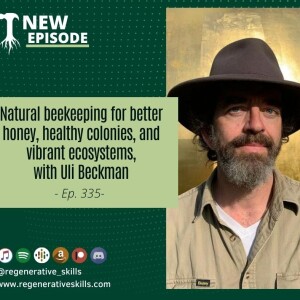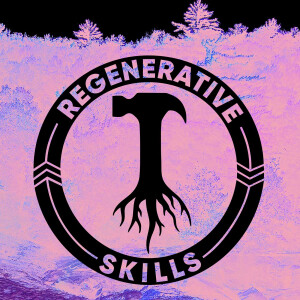
Natural beekeeping for better honey, healthy colonies, and vibrant ecosystems, with Uli Beckman
 2024-04-05
2024-04-05
I’ve had the pleasure over the last few months to interview quite a few people that I admire, who’ve told me about their fascination with beekeeping. Over and over again I’ve heard about the incredible insights into overall ecological health and the amazing reflections of ecosystem function that can be observed through managing bee hives.
I got a window into the world of natural beekeeping back in May of 2022 when I co-hosted a Climate Farmer’s community event at Wilmer’s Gaerten, a regenerative farm just south of Berlin. Since then I've been looking for an opportunity to speak with Uli Beckman, the instructor on our course on beekeeping and management who helped me to see a whole new possibility in how to promote healthy colonies that in turn promote health ecosystems and people. This is exactly what today’s episode is all about.
Uli’s company, Beckmann Urtracht was founded in 2015 with the aim of consistently working in such a way that the beekeeper takes a back seat to the needs of the bees. Today, their principles and way of working far exceed anything required to be certified as an organic beekeeper. Natural propagation, natural honeycomb, built entirely by the bees, natural nutrition and minimal intervention are their maxims. Because with every jar of honey we hold in our hands, we must not forget that the bees did not produce it for us, but as food for themselves. Beckmann Urtracht is the alternative to maximizing yields and obtaining varietal honeys. The end result is an honest, original honey that can only be harvested in small quantities, but is outstanding in terms of quality and taste as well as its ecological and bee-friendly production.
In todays conversation with Uli, we start by comparing and contrasting the conventional practices of industrial beekeeping and how they differ from the principles that guide natural beekeeping.
From there we go into the details of not only the life cycle and behavioral patterns of bees and how those inform how to manage them well, but also the practical side of building hives that promote their health and the environmental factors that present a real challenge to the future of the species.
In the process we also unpack the history of beekeeping in Europe and the innovators how pioneered new management methods based on relationship over extraction. We cover advice on how to get started with your own hive and expectations of time and equipment for keeping bees too.
I’m sure that by the end of this episode you’ll come to understand why many of the most influential and insightful people in the world of regenerative land management have become beekeepers themselves.
More Episodes
 2024-06-21
2024-06-21
 2.1k
2.1k
 2024-05-17
2024-05-17
 2.2k
2.2k
 2024-05-10
2024-05-10
 3.4k
3.4k
 2024-04-19
2024-04-19
 2.6k
2.6k
 2024-03-22
2024-03-22
 2.1k
2.1k
Create your
podcast in
minutes
- Full-featured podcast site
- Unlimited storage and bandwidth
- Comprehensive podcast stats
- Distribute to Apple Podcasts, Spotify, and more
- Make money with your podcast
It is Free
- Privacy Policy
- Cookie Policy
- Terms of Use
- Consent Preferences
- Copyright © 2015-2024 Podbean.com





